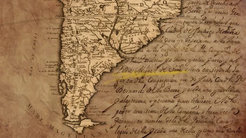From the Indies to Rome. The travel diary of an unfinished journey by the jesuit Miguel de Viñas (1677-1698)
Research Project

This project is based on a unique and rare corpus of documents preserved in the Archive of the Colegio de San Ignacio in Santiago de Chile: a series of documents relating to the journey that the Spanish Jesuit Miguel de Viñas undertook between 1677 and 1698 in the performance of his duties as procurator and which led him from Chile to Europe and back.
Born in Martorell (Barcelona) in 1642, a year after the sacking and burning of the city during the guerra dels Segadors against the rule of Philip IV, Miguel de Viñas was educated in Tarragona. He arrived as a novice in Peru in 1671, where he received his full. In 1680, he travelled to Santiago de Chile as professor of philosophy and theology at the Colegio Máximo de San Miguel, where he was vice-rector and later rector (1682-1694). In that position, and perhaps thanks to the prestige of the Society in the city of Santiago, he quickly became a trustworthy person in a social and political community like the Chilean one, which had suffered several cases and scandals of corruption and influence peddling under the governments of Francisco de Meneses (1664-1667) and Juan Henríquez (1670-1682). He was a consultant to the Synod of Santiago, convened by Bishop Bernardo Carrasco de Saavedra in 1688. In 1694, he was appointed procurator by the I Provincial Congregation to take part in the XV General Congregation of the Society of Jesus in Rome. Viñas was unable to make his trip to Rome, probably because he prioritise the search for missionaries for the province of Chile. In fact, he returned to Santiago in April 1699 with 36 new missionaries.
The volume at the center of this project is composed of several documents, originals and copies, of very varied typology, written by different authors and for different purposes. The documents also go beyond the period in which Miguel de Viñas' journey took place and connect it with our times and with the desk of a Jesuit historian, Walter Hanisch (1916-2001). This historian not only ordered the documentation chronologically, but also added to the list various sources to complement what seems to be a possible vein of research that he never completed.
Royal decrees; letters from bishops and governors; letters to the king; powers of attorney and instructions for procurators traveling to Rome; Jesuit orders, dispensations and provisions; memorials to the Council of the Indies and its decrees, letters patent, licenses and even more types of documents fill the 189 manuscript folios of the volume. It is an orderly compilation of documents that the Jesuit procurator accumulated during his journey, as he traveled between distant, different, but at the same time connected spaces, and which he transported back to Santiago with the purpose, we understand, of giving an account of what he had done in Europe and during the journey. In this sense, the volume can be considered as a "record of all the documents and instructions of his journey", as the description of the volume in Hanisch's catalog puts it, or as the "logbook" of Miguel de Viñas's journey between America and Europe.
However, the nature of the documents allows us to go further in our interpretation. They are in fact legal documents that regulate the different phases of Viñas' mission in America and Europe: they grant powers; they entrust tasks; they define functions, responsibilities and duties; they confirm rights and privileges; they protect personal and collective interests; they allow the voyage to be carried out according to rules and customs that operate in a complex, diverse world on an Atlantic scale.
The religious procurators, although not much studied by historiography, played a fundamental role as representatives of their orders or their bishops in Spain or in Rome, where they acted as mediators, political and business agents and passeurs of documents between Europe and the New World, contributing to the creation of both institutional and informal links between the different parts of the Monarchy and beyond. During their travels, they also performed the function of connecting various institutions, circulating information and knowledge, and enabling legal, economic and political processes to proceed at different levels. Finally, they also had their own interests or looked after those of their relatives. Viñas, for example, managed to publish a three-volume book, Philosophia Scholastica, in Genoa in 1709, which was subsequently sent to the Colegio Máximo de la Compañía de Jesús in Santiago.
Based on the various documents collected by Miguel de Viñas, the project aims to analyze the complex links between his role as Jesuit procurator and compiler of documents in his transit between Europe and America in the late seventeenth century. In this way, through the analysis of the construction of this type of documentation, we can observe how these agents linked people, functions and knowledge in their Atlantic circulation. The main result of the project will be the publication of a critical edition of the corpus of documents related to Miguel de Viñas’s journey, based on the transcription of the manuscript preserved in Santiago. To this task, we will add some scientific articles related to the figure of Miguel de Viñas and other procurators who mediated between the Old and New World in the early modern times.
Activities
Conferences
- Benedetta Albani and Rafael Gaune, Una persona intermedia, un viaje y varios documentos aún sin entender... La mundialidad católica desde un procurador (Santiago-Roma 1692-1699-1709), Seminario internacional: Integración, reintegración y desintegración religiosa en Europa y América, Universidad de Chile-Pontificia Universidad Católica de Chile, Santiago de Chile, 16-17.01.2019.
